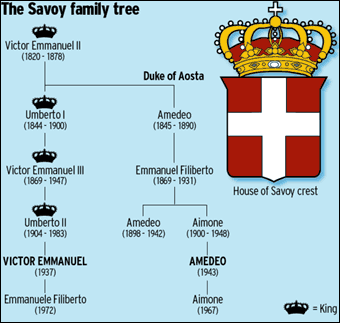I followed with attention and with particular satisfaction what was rightly reported by the national newspaper "il Corriere della Sera" with the interview, which I shared, given by my son Emanuele Filiberto and subsequently taken up and relaunched by many national and foreign newspapers.
The media attention that this position has aroused demonstrates the great interest in the subject that I wanted to address three years ago: the abolition of the Salic law; the international attention that attracted the young figure of my granddaughter Vittoria confirms the goodness of my choice, that is to allow a woman to become the Head of my House tomorrow.
I greatly appreciated and support the words that my son used, for the love for Vittoria and for the delicacy of her gesture in addressing this issue, in explaining to the Italians my will with this historic decision.
The abolition of the Salic law, which respects my precise will, is certainly in step with the times, which I wanted and sought to emphasize the importance that the Women of the House of Savoy have always had over the centuries and that thanks to Vittoria will continue to have in future years.
My son's statements make me proud of him, because they confirm what we have done so far together, strengthen our choices, strengthen our ideas and weld our will.
What he said I consider absolutely a courageous choice, which I share and that does not surprise me, because I know perfectly well what he thinks and how he acts, I know what education he is giving to my granddaughter Vittoria and I know how both are united in the intentions and projects of our House.
A choice, that of my son Emanuele Filiberto, which will take place at the right time and desired by him, which will take place when my granddaughter is ready and prepared, which will give new impetus and vigor to my family.
For the moment absolutely nothing changes: we work daily together and always in close contact with each other, he supports me and I support him, everything is always agreed between us and I am absolutely happy with the results that my son gets, for the appreciation that his commitment arouses in people, for the love that Italians give him and for what he does with real heartfelt impulse towards those in need.
In these years my granddaughter Vittoria has grown, I have appreciated more and more the seriousness and maturity, sensitivity and attention to others demonstrated on several occasions, not least in her mission in the tormented Ukraine.
Your public and institutional commitments are slowly increasing and you are rigorously assuming your just responsibilities, before the House that I am increasingly called to represent before the Italians, to whom you owe respect and dedication.
I speak regularly and I am pleased to discuss with you on issues that are increasingly important from time to time and I appreciate more and more the seriousness and commitment, especially for your growing attention to the Dynastic Orders of my House, characterized today more than ever by the care for the social and for the "third sector", from help to the needy and concrete support during the last numerous natural disasters, especially in the beloved Emilia Romagna.
I am sure and sincerely convinced that my granddaughter Vittoria will become more and more a strong point of reference for the whole Royal House of Savoy, so I invite all of you to support her in her projects and ideas, in following her and helping her in the important path she is facing and that will see her in the future a safe protagonist.
Vittorio Emanuele.



